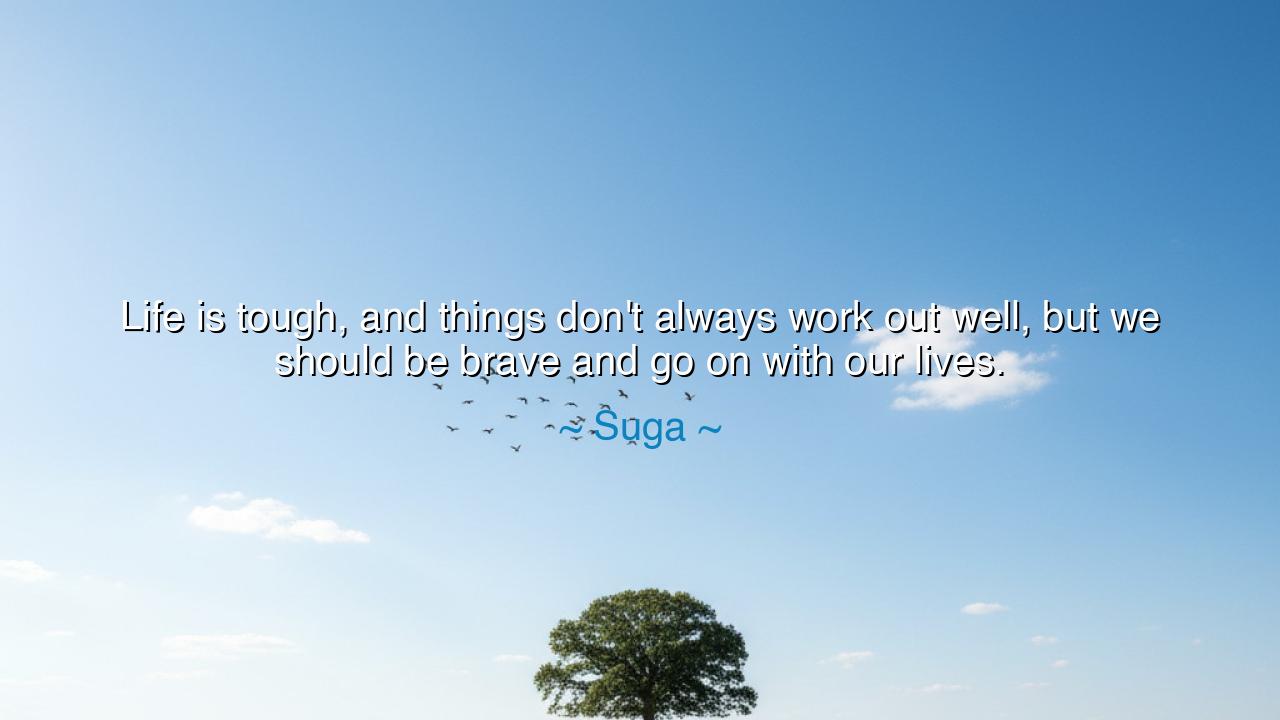
Life is tough, and things don't always work out well, but we
Life is tough, and things don't always work out well, but we should be brave and go on with our lives.






"Life is tough, and things don't always work out well, but we should be brave and go on with our lives." These words from Suga, a member of the renowned group BTS, resonate with an eternal truth — that life, in its essence, is full of challenges, adversity, and obstacles, yet the strength to persevere and move forward defines our character. Suga reminds us that while the world may be unkind and circumstances may often seem impossible, the true test of human strength lies in how we face those struggles. We are not meant to be defeated by life's hardships, but to rise above them with courage, bravery, and an unwavering commitment to keep moving forward.
The origin of this sentiment can be traced back to the wisdom of the ancients, who recognized that life’s difficulties were an inherent part of the human journey. In Greek philosophy, for instance, the Stoics believed that suffering and hardship were unavoidable elements of existence. Epictetus, the Stoic philosopher, taught that we cannot control what happens to us, but we can control how we respond. He said, “It’s not what happens to you, but how you react to it that matters.” This aligns with the core of Suga’s message: while we cannot avoid the difficulties life throws our way, we have the power to choose how we respond and how we carry on in the face of adversity.
In the story of Hercules, the great hero of Greek mythology, we see this theme embodied in the twelve labors he was forced to complete. Each labor was more daunting and dangerous than the last, yet Hercules showed remarkable courage and resilience in overcoming these trials. His willingness to face insurmountable odds and persevere through suffering made him a symbol of strength and determination. Just as Hercules did not allow the overwhelming nature of his challenges to defeat him, so too must we, like Suga advises, summon our bravery and carry on when faced with adversity.
This idea of perseverance can also be seen in the life of Nelson Mandela, who endured years of imprisonment under the apartheid regime in South Africa. Despite the injustice and suffering he faced, Mandela’s resolve never wavered. He once said, “I am not a saint, unless you think of a saint as a sinner who keeps on trying.” His words echo Suga's message: life is tough, and things do not always go as planned, but it is in the struggle and the refusal to give up that true strength is found. Mandela's eventual triumph was not just his release from prison, but his ability to continue fighting for justice and peace, showing us that resilience and the strength to go on can transform even the darkest of circumstances into something powerful and transformative.
As we reflect on these teachings, we must also recognize that life itself, in its most profound moments, often reveals that bravery is not about the absence of fear or difficulty, but about the strength to act in spite of it. Buddhist teachings, particularly those of Sakyamuni Buddha, emphasize the inevitability of suffering in human existence. However, they also teach that attachment to suffering is the root of sorrow. The true path, then, is not to avoid suffering but to accept it with equanimity and to continue forward with compassion for ourselves and others. Just as Suga calls us to keep going despite life’s hardships, the Buddha reminds us that embracing adversity and learning from it is the way to find lasting peace and growth.
The lesson here is both simple and profound: perseverance is the key to living fully. No matter the setbacks we face, no matter the storms that rage around us, we must continue. The bravery to rise after every fall, to push forward with courage even when it seems impossible, is what makes us human. As Suga advises, we must be brave in the face of the hardships life throws at us. In our own lives, we must cultivate the strength to keep going, to seek out hope even in the darkest of times, and to understand that growth comes not from avoiding suffering, but from facing it with grace and determination.
To apply this wisdom in our own lives, we must practice mindfulness in the face of adversity. When challenges arise, rather than retreating in fear or becoming overwhelmed, let us take a deep breath and acknowledge the difficulty. Then, we must make the choice to continue, to keep moving, and to trust that each step forward, no matter how small, brings us closer to overcoming the obstacles before us. Like Hercules, like Mandela, like Suga, we must choose to embrace the struggle, understanding that it is through the act of continuing — no matter the odds — that we build a life of purpose, strength, and resilience. Let us be brave, for the road ahead is not always clear, but with courage, we can navigate even the darkest paths.






AAdministratorAdministrator
Welcome, honored guests. Please leave a comment, we will respond soon